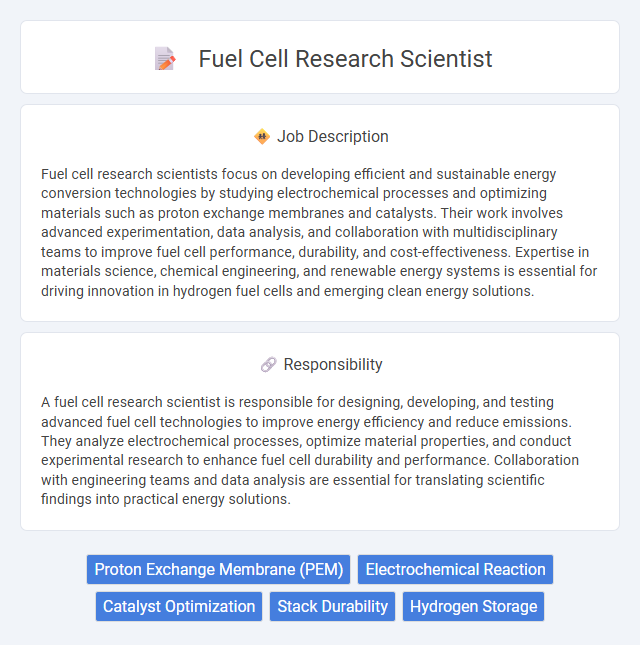
Fuel cell research scientists focus on developing efficient and sustainable energy conversion technologies by studying electrochemical processes and optimizing materials such as proton exchange membranes and catalysts. Their work involves advanced experimentation, data analysis, and collaboration with multidisciplinary teams to improve fuel cell performance, durability, and cost-effectiveness. Expertise in materials science, chemical engineering, and renewable energy systems is essential for driving innovation in hydrogen fuel cells and emerging clean energy solutions.
Individuals with strong analytical skills and a passion for sustainable energy solutions are likely well-suited for a fuel cell research scientist role due to the complex nature of the work involving experimentation and data interpretation. Those who thrive in collaborative environments and can handle long hours in laboratory settings may find this position more compatible with their professional and personal attributes. People with a keen interest in chemistry, materials science, and innovation might find the job both challenging and rewarding, enhancing their job satisfaction and career growth prospects.
Qualification
A Fuel Cell Research Scientist typically requires a Ph.D. or Master's degree in chemical engineering, materials science, or electrochemistry, with extensive experience in fuel cell technologies and electrochemical systems. Proficiency in advanced analytical techniques, catalyst development, and membrane electrode assemblies is crucial for developing high-efficiency fuel cells. Strong computational modeling skills and knowledge of renewable energy systems enhance research capabilities in optimizing fuel cell performance and durability.
Responsibility
A fuel cell research scientist is responsible for designing, developing, and testing advanced fuel cell technologies to improve energy efficiency and reduce emissions. They analyze electrochemical processes, optimize material properties, and conduct experimental research to enhance fuel cell durability and performance. Collaboration with engineering teams and data analysis are essential for translating scientific findings into practical energy solutions.
Benefit
A fuel cell research scientist position likely offers significant benefits such as opportunities to work on cutting-edge clean energy technologies that contribute to reducing carbon emissions. Employees may experience professional growth through collaboration with leading experts and access to state-of-the-art laboratories. Compensation packages might include competitive salaries, health benefits, and potential funding for attending conferences or further education.
Challenge
Fuel cell research scientists likely face significant challenges related to improving the efficiency and durability of fuel cells while reducing costs to make them commercially viable. Balancing experimental design with advanced materials analysis may demand innovative problem-solving and multidisciplinary collaboration. The evolving regulatory and environmental standards probably add complexity to navigating long-term project goals and funding stability.
Career Advancement
Fuel cell research scientists drive innovation in clean energy by developing efficient and sustainable fuel cell technologies. Expertise in electrochemistry, materials science, and systems engineering enhances opportunities for leadership roles in academia, industry, and government research labs. Advancing career prospects often involves publishing impactful research, securing patents, and collaborating on interdisciplinary projects to address energy challenges.
Key Terms
Proton Exchange Membrane (PEM)
Fuel cell research scientists specializing in Proton Exchange Membrane (PEM) technology develop and optimize membrane materials to enhance hydrogen ion conductivity and durability under various operating conditions. Their work involves synthesizing novel polymer electrolytes, conducting electrochemical performance tests, and improving membrane electrode assembly (MEA) designs to increase fuel cell efficiency and lifespan. These scientists employ advanced characterization techniques such as impedance spectroscopy and microscopy to analyze membrane degradation mechanisms and drive innovations in clean energy conversion.
Electrochemical Reaction
Fuel cell research scientists specialize in studying and optimizing electrochemical reactions that convert chemical energy into electrical energy, aiming to enhance fuel cell efficiency and durability. They analyze electrode materials, catalyst performance, and reaction mechanisms to improve energy output and reduce degradation. Advanced knowledge in electrochemistry, materials science, and modeling techniques is essential for developing next-generation fuel cells with higher power density and lower environmental impact.
Catalyst Optimization
Fuel cell research scientists specializing in catalyst optimization develop advanced catalytic materials to enhance fuel cell efficiency, durability, and cost-effectiveness. They investigate novel nanostructured catalysts, such as platinum alloys and non-precious metal compounds, to improve electrochemical reactions and reduce platinum loading. Extensive use of techniques like cyclic voltammetry, TEM imaging, and density functional theory accelerates the design of high-performance catalysts for hydrogen fuel cells.
Stack Durability
Fuel cell research scientists specializing in stack durability investigate materials and design improvements to enhance the lifespan and performance of fuel cell stacks under operational stress. Their work involves analyzing degradation mechanisms, optimizing membrane-electrode assemblies, and testing new catalysts to reduce wear and maintain efficiency over time. Advances in stack durability directly contribute to the commercial viability and reliability of fuel cell technologies in automotive and stationary power applications.
Hydrogen Storage
Fuel cell research scientists specializing in hydrogen storage develop advanced materials and technologies to enhance the safety, efficiency, and capacity of hydrogen fuel systems. They conduct experimental studies on metal hydrides, carbon-based adsorbents, and chemical hydrogen storage compounds to optimize energy density and storage kinetics. Their work supports the commercialization of hydrogen-powered applications in transportation and renewable energy sectors by addressing critical challenges in storage stability and refueling infrastructure.
 kuljobs.com
kuljobs.com